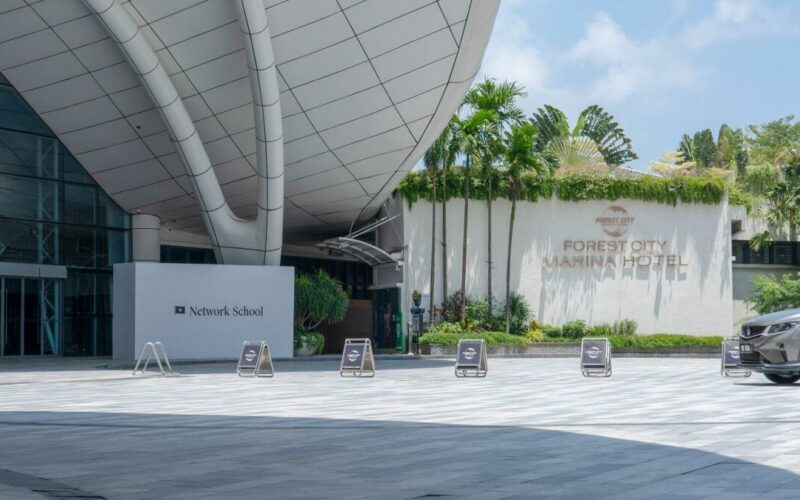In a hotel-turned-campus on a reclaimed island in Malaysia, crypto and tech entrepreneurs are building software, chomping down Australian prime ribeye, hitting the gym — and getting schooled in a radical blueprint for creating new sovereign states from scratch.
They have descended on Forest City to attend Network School, the brainchild of former Coinbase Inc. executive and The Network State author Balaji Srinivasan. In this troubled megaproject once envisaged to house some 50 times its current population, they’re conducting a real-life experiment of sorts with Srinivasan’s vision of “startup societies” defined less by historical territory than shared beliefs in technology, cryptocurrency and light regulation.
Techno-utopian ideas have circulated in Silicon Valley and the crypto community for well over a decade, with few signs of gaining wider acceptance. Yet Srinivasan is doubling down on his bet that the world is ripe for his brand of nation-state disruption, and is making Forest City a testing ground for plans to roll out the movement globally.
“Just like at age 18 you choose your college, at age 18 you’ll choose your country,” Srinivasan said on Thursday in a keynote speech at the Bitcoin Asia conference in Hong Kong. “And it’s already starting with the startup societies.”
Recent events have provided some tailwind for the quixotic effort. The election of Donald Trump, and the crypto-friendly policies he’s pursued, have rapidly pushed the asset class into the financial mainstream. More broadly, Trump’s win was also seen as a repudiation of the “woke” ideology and regulatory overreach Srinivasan has long criticized.
While it isn’t clear exactly why Srinivasan picked Forest City for his school, the location offers some distinct advantages, not least low rents and easy access to Singapore and its international airport. Officials seeking to stave off political fallout from what’s been widely derided as a white elephant have taken a raft of measures to increase its appeal, including designating it a duty-free zone. Authorities have dangled a 0% tax rate for family offices — investment vehicles for the ultra-rich — to set up shop there.
Nearly 400 students, many of them entrepreneurs, have so far made the journey to Forest City to study everything from coding to unconventional theories on statehood. They’re building crypto projects, fine-tuning their physiques and testing whether a shared ideology — rather than just shared territory — can bind a community. The price starts at $1,500 per month, including lodging and food, for those who opt for a shared room.
Network School’s curriculum blends the practical and the ideological. Mornings are spent in product sprints and coding sessions; afternoons in seminars exploring topics from the Meiji Restoration to Singapore’s statecraft and the mechanics of decentralized governance. Guest lectures double as both technological deep-dives and ideological sermons, according to half a dozen students interviewed by Bloomberg.
The campus also mirrors Silicon Valley’s infatuation with longevity and health, right down to a commercial-grade gym and specially designed workout routines. Students follow a protein-heavy diet inspired by longevity guru Bryan Johnson’s “Don’t Die” movement. The menu of the restaurant at the Marina Hotel, a kind of social nexus for the school, is heavy on protein shakes and steak.
“We’re all getting jacked,” said Prad Nukala, a student at the school and founder of crypto startup Sonr, which describes itself as a “blockchain for decentralized identity.”
After co-founding DNA testing startup Counsyl in 2008 and serving as its chief technology officer, Srinivasan spent five years at venture capital firm Andreessen Horowitz, first as general partner and then as board partner. He joined Coinbase as CTO in 2018 when the crypto exchange bought a portfolio company he oversaw and left after a little over a year, according to his LinkedIn profile.
In a 2013 speech at Y Combinator’s Startup School, Srinivasan brought his ideas about what he saw as a fundamental conflict between some modern nation states and innovation to a wider audience. In the address, he advocated for Silicon Valley’s “ultimate exit” from the US, which he argued was obsolete and hostile to innovators. In essence: If the society you live in is broken, why not just “opt out” and create a new one?
The Network State: How To Start a New Country, published in 2022, expanded on Srinivasan’s “exit” concept to outline how online, ideologically aligned communities can use crypto and digital tools to form new, decentralized states. A network state can be geographically dispersed and bound together by the internet and blockchains, he says, and the aim is to gain diplomatic recognition.
Srinivasan, a prolific public speaker, podcast guest and poster on X who peppers his speech with historical analogies, often takes aim at what he calls the “Blue Tribe,” shorthand for the US liberal, Democratic-aligned political class. On the Moment of Zen podcast in September 2023, he outlined how the “Gray Tribe” — entrepreneurs, innovators and thinkers — can retake control of San Francisco from the Blues using a variety of tactics, like allying with local police.
The effort would involve gaining control of territory, according to Srinivasan, who didn’t advocate for violence. “Elections are just the cherry on the cake,” he said. “Elections are just a reflection of your total control of the streets.”
Srinivasan, who has also criticized Trump policies, didn’t respond to requests for comment.
With Network School, Srinivasan directed his pitch squarely at the like-minded. “The more respect you have for legacy institutions, and the more respect they have for you, the less suitable you’ll be as an applicant,” Srinivasan wrote in an August 2024 blog post announcing the first enrollment.
To Jack Schneider, director of the Center for Education Policy at the University of Massachusetts Amherst, educational projects backed by tech elites can smack of hubris. “I don’t doubt that there’s a sincere charitable impulse for lots of these folks,” Schneider said. “But then there’s another impulse, which is to believe not only that you are a visionary in terms of your ability to redesign systems and structures, but that you also have a unique insight into human nature and the way that people should be leading their lives.”
Alyse Sue, co-founder of a decentralized-science project called Transhuman Coin, joined the first Network School cohort last year after what she described as a spur-of-the-moment application. “I wrote, ‘I’m a girl — does that give me extra brownie points?'” she recalled.
When Network School launched, Sue reorganized her life to join. Some other attendees quit their jobs or relocated their startups to Forest City, she said.
For Sue, the school was a natural fit. A decade earlier, she had helped start a “transhumanist meetup” in a Sydney pub that happened to be one of the first in the city to accept Bitcoin. That small community evolved into a project aimed at funding longevity research and biotech experiments, from brain-computer interface studies at the University of Technology Sydney to collaborations with early-stage labs on cancer and aging.
Willy Ogorzaly came to Forest City mainly to accelerate his crypto startup and secure some funding, although he was also drawn to Srinivasan’s teachings. While he said the curriculum “definitely aligns with my values,” the biggest benefit was the practical knowledge gained from a range of workshops — and the opportunity to work on his business surrounded by like-minded people.
“All day, you’re surrounded by other awesome builders,” the 33-year-old said. His project, Nounspace, won third prize and collected $20,000 in a pitch competition (which wasn’t run by Network School) that took place while he was there.
Ideas similar to Srinivasan’s have long percolated on the fringes of political thinking, embodied in part in efforts like the Seasteading initiative initially backed by billionaire Peter Thiel, which seeks to build floating countries in international waters. And while often promulgated by wealthy techno-evangelists in Silicon Valley, these movements have at times found a haven in emerging-market enclaves like Forest City, where costs are far lower and liberal norms are less entrenched.
In 2022, Ethereum co-founder Vitalik Buterin conducted his own crypto-centric community experiment in a Montenegrin resort named Zuzalu, which involved some 200 people and lasted about two months. He cited Srinivasan’s book as an inspiration for the project.
“The advantage of doing that in a sort of a far flung remote location is you’re not really setting yourself up to compete with the establishment,” said Stuart Rollo, researcher and teacher at the Center for International Security Studies at the University of Sydney who studies how emerging technologies shape societies. “It’s new, it’s very cheap to operate and you can probably appeal to that utopianism more effectively.”
Other self-governing experiments have suffered setbacks. Prospera, a privately run city in Honduras that bills itself as such, became embroiled in a legal dispute with its host country. Thiel, an early investor in the Seasteading Institute, later cooled on the idea.
Srinivasan says he’s just getting started.
In February, he wrote on his blog that Network School will build a permanent campus near its current location “to house thousands of technologists from all around the world.” The construction will employ a “portable template” that can easily be replicated across the world, with plans for Network School “nodes” in Miami, Dubai and Tokyo. After that comes perhaps the boldest step: seeding similar movements around the world.
“Many Network Schoolers will attend with the intent of eventually starting their own societies, using the social, digital, and physical templates we develop at Network School,” Srinivasan wrote. “We intend to fund the best.”
For Forest City, which is a shadow of the $100 billion metropolis its distressed Chinese developer once pitched, playing host to the beta testing of a new kind of nation brings advantages — no matter how trivial.
“With the Network School now, we’re seeing multiple nationalities in Forest City,” said Lee Ting Han, executive councilor for investments in Johor, where the project is located. “It’s brought an energy to the area that was missing.”







